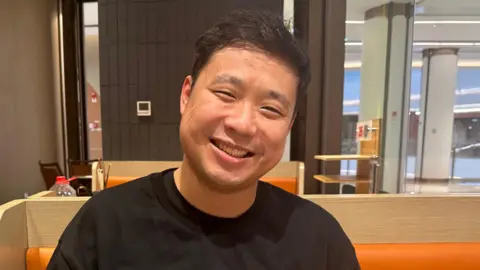
 BBC/Rachel Yeo
BBC/Rachel YeoChina has now become a country where a skilled high school worker earns a master's degree in physics; Cleaner qualified in environmental planning; A delivery driver who studied philosophy, a doctoral graduate from the prestigious Tsinghua University ends up applying to work as an assistant police officer.
These are real cases in a faltering economy – and it is not difficult to find similar cases.
“My dream job was to work in investment banking,” says Sun Zhan as he prepares to start his shift as a waiter at a restaurant in the southern city of Nanjing.
The 25-year-old recently graduated with a master's degree in finance. He had hoped to “make a lot of money” through a high-paying job, but adds: “I looked for such a job, without good results.”
China produces millions of university graduates every year, but in some fields, there are not enough job opportunities for them.
The economy is suffering and faltering in key sectors, including real estate and manufacturing.
Youth unemployment was rising to 20% before the method of measuring numbers was changed to make the situation look better. In August 2024, the percentage was still 18.8%. The latest figure for November fell to 16.1%.
Many university graduates who have found it difficult to get work in their chosen field of study, are now doing far fewer jobs than they are qualified for, leading to criticism from family and friends.
When Sun Zhan became a waiter, it was met with dissatisfaction with his parents.
“My family's opinions are a big concern for me. After all, I studied for many years and went to a very good school,” he says.
He says his family is embarrassed by his choice of job and would prefer if he tried to become a public servant or official, but he adds: “This is my choice.”
However, he has a secret plan. He will use his time working as a waiter to learn the restaurant business so he can eventually open his own restaurant.
He believes that if he ends up running a successful business, the critics in his family will have to change their tune.
“The employment situation is really challenging in mainland China, so I think a lot of young people have to really adjust their expectations,” says Professor Zhang Jun of the City University of Hong Kong.
She says many students seek higher grades for better prospects, but then are hit by the reality of the work environment.
“The job market has been very difficult,” says Wu Dan, 29, who now works as an intern at a sports injury massage clinic in Shanghai.
“For many of my master’s classmates, this is their first time looking for a job, and very few of them end up getting one.”
She also didn't think this was where she would end up with a finance degree from the Hong Kong University of Science and Technology.
Before that, she worked at a futures trading company in Shanghai, where she specialized in agricultural products.
When she returned to the mainland after finishing her studies in Hong Kong, she wanted to work for a private equity firm and got some offers but was not satisfied with the terms.
She did not accept any of them and instead began training in sports medicine, which her family did not welcome.
“They thought I had a good job before, and that my educational background was very competitive. They didn't understand why I would choose a low-barrier job that required me to do physical labor for little money.”
She admits that she could not live in Shanghai on her current salary, if it were not for the fact that her partner owns their house.
At first, she didn't know anyone who would support her current career path, but her mother would come forward, having recently treated her for her back pain, which greatly reduced the pain she was experiencing.
Now a one-time finance student, she says she feels life in the investment world is not for her at all.
She says she is interested in sports injuries, loves the job, and one day wants to open her own clinic.
 BBC/Rachel Yeo
BBC/Rachel YeoProfessor Zhang says Chinese graduates are having to change their perceptions of what constitutes “good standing”.
She adds that in what could be seen as a “warning sign” for young people, “many companies in China, including many technology companies, have laid off a large number of employees.”
It also says that large areas of the economy, which once heavily employed graduates, now offer substandard conditions, and decent opportunities in these areas are disappearing altogether.
While they work out what to do in the future, unemployed graduates are also turning to the film and television industry.
Big-budget films need a lot of extras to fill their scenes, and in China's famous film production city of Hengdian, southwest of Shanghai, there are a lot of young people looking for acting work.
“I basically stand next to the protagonist as eye candy. I'm seen next to the main actors but I don't have lines,” says Wu Xinghai, who studied electronic information engineering and was playing a bodyguard in a drama.
The 26-year-old laughs that his good looks helped him land an extra job.
He says people often come to Hengdian and work for only a few months at a time. He says this is a temporary solution for him too, until he finds something permanent. “I don't make a lot of money but I'm comfortable and I feel free.”
 Getty Images
Getty Images“This is the situation in China, isn't it? The moment you graduate, you are unemployed,” says Li, who did not want to give his first name.
He specialized in film directing and screenwriting and also signed up to work as an assistant for a few months.
“I came here to look for work when I was still young. When I grow up, I will find a stable job.”
But many fear they will never get a decent job, and may have to accept a role different from what they imagined.
A lack of confidence in the trajectory of the Chinese economy means that young people often do not know what the future holds for them.
Wu Dan says even her friends who work can feel completely lost.
“They are very confused and feel that the future is unclear. Those who have jobs are dissatisfied with them. They do not know how long they can keep these positions. If they lose their current jobs, what else can they do?”
She says she will “go with the flow and gradually discover what I really want to do.”







